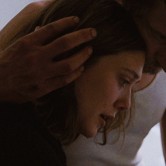Movie Review: PRECIOUS: Based on the Novel PUSH by Sapphire (2009)
![]()
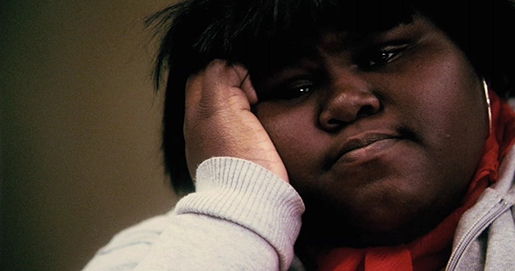
Blossoming Out of Child Abuse
The odds are against Clarice “Precious” Jones (Gabourey Sidibe). How does she find the will to get up in the morning and go to school? It seems as though everyone is either punishing her or ignoring her. At 16, she is pregnant for the second time by her scumbag father. Her self-esteem is all but destroyed by her vicious mother (Mo’Nique). She is illiterate, but not stupid. As a poor African-American woman living in Harlem in 1987, her options are limited. If incest, racism, sexism and classism weren’t enough, Precious is also targeted for being obese. She can hardly bear to face anyone let alone speak in a guarded whisper. Her pain is so definite. Society and her parents have failed her, however, Precious is still holding on.
We never pity her because anyone would be devastated if struck with her afflictions. What fascinates me still is that Precious takes the time to brush her hair nicely and wears necklaces. She obviously has a fighting spirit. This is her rebuke to all who vilify her. It may be a small one, but it’s there. She is going to look her best, dammit. Her only other refuge is to fantasize. In a harrowing scene, she remembers how her father raped her in her bedroom one night. Her mother watches from behind the door frame with timidity and — oh dear God! — jealousy. It is so horrible that the ceiling cracks and in a faraway place, Precious walks up a red carpet to her own premiere looking gorgeous for the adulated crowd. Perhaps, I shouldn’t be so astonished to find Precious putting on such a brave front. People are notoriously stubborn to survive personal attacks.
The case of Precious is really about how deadly living in a toxic family is. It is also about how body image can ruin self-worth, which is a grave factor all by itself. However, the worst thing happening to Precious is the abuse she receives from her parents. An overweight and mentally-struggling person can still be happy with the support of loved ones. Precious is unloved and can only go so far alone.
Precious is told with the horror and uplifting tone of a fairy tale. Her father is never home, but his presence is always felt. He haunts Precious and her mother Mary, a woman whose insecurities have made her so twisted and self-loathing that she views her daughter as competition. She even treats her like a housekeeper, like Cinderella. It would just kill Mary to see Precious ahead of her own slothful level in life. She comes up with punishments like forcing Precious to eat copious amounts of burnt, fried food. Mary holds Precious hostage by keeping the girl’s firstborn hidden in the care of a relative. The name of Precious alone is such a irony to Mary that it deserves comparison in terms of sadism to Frollo naming the disfigured child he adopted Quasimodo — half-formed.
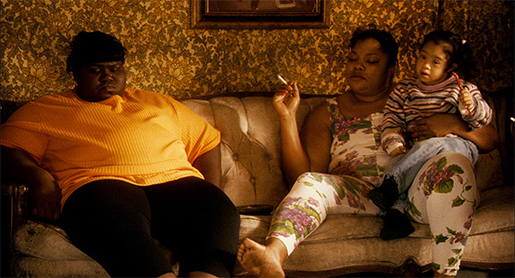
Precious’ life takes a radical turn after her high school principal encourages the pregnant teen to attend an adult GED program called “Each One Teach One”. Self-serving Mary forbids this and demands that Precious apply for welfare. Precious does both, sneaking to continue her education, and connects with two working women who become her saviors. One is a sunny teacher named Miss Rain (Paula Patton) who builds up Precious’ confidence and the other is Mrs. Weiss (Mariah Carey), a social worker who takes a vested interest in her. Learning to read and nearing the delivery of her pregnancy, Precious slowly begins to open herself up to people who could possibly help her. She also manages to form fragile friendships with her classmates.
Faithfully adapted by Geoffrey Fletcher, Precious was based on Push (1996), the only novel written by Sapphire. She was a highly regarded underground poet and writer who was no stranger to struggling for an education due to her family’s abandonment. Push uses its raw text (“I is ready. Ready for school. School gonna help me get out dis house.”) to convey Precious’ illiteracy from her point of view and demonstrates how she improves herself through her writing. Like Celie’s voice in Alice Walker’s The Color Purple, this literary device is used effectively in the sparse titles in the film. From there, director Lee Daniels has crafted a very fine film. As producer of Monster’s Ball (2001) and The Woodsman (2004), Daniels makes Precious look more expensive than his tightly-budgeted independent film lets on. Daniels also shows his continued interest in portraying conflicted characters in a very humane way that does not shy away from the horror of their lives.
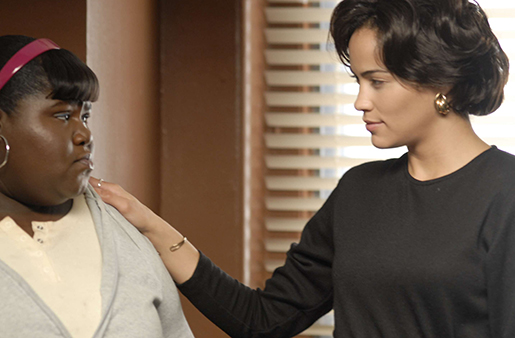
It is very astute the way Mary’s abuse toward Precious is depicted. Instead of spreading out the torture in little bits, we are confronted with the blunt, unforgiving force of Mary’s rage. As Precious stands frozen with fear and resignation at the top of the stairs, she absorbs a long and merciless monologue of obscene insults. Here’s a taste: “I should have aborted your ass!” A beating that follows is held off-screen where a fade to black settles the aftershock even further. Again, I am astonished Precious hasn’t killed herself after living with this monster for years. Perhaps she copes because this treatment is all she knows. When Precious is loved, she breaks.
There is one temptation that the filmmakers never succumb to and that is giving Precious a boyfriend. It’s so devastating that her father is the only guy to have touched her. This film is tough and expects the same of us as well. Whether Precious finds her prince is reserved for speculation into her unknown future. As a victim of incest, it’s a good question how she can ever trust another man to get close to her at all. The goal of this story is to see if Precious can achieve independence through her education. Perhaps the most heartbreaking observation Precious makes is, “Why should people who don’t know me are nicer to me than my mommy and daddy?” At least Precious has an opportunity to play matchmaker in a scene that ends with one of the funniest telephone hang-up I have seen besides in Ed Wood (1994).
For all of the truly dark places Precious ventures into, Daniels and Fletcher have the freedom and ingenuity to fill Precious’ journey with some great wit and warmth. Comic relief is such a bad word in stories like this, but it is used wisely here without diluting the seriousness. Laughter is a hell of a defense. Has there ever been a better scene of a mother tickling her baby? The welcome levity of the classroom scenes, those in a hospital as well as a surprising riff on Vittorio De Sica’s La Ciociara (1960) relieve us of Precious’ tragedies, but makes them even more wounding when the demons return.
The characters feel more extreme, but no one here is a caricature. They are founded on thoughtful motivation and detail. When asked to read aloud, Precious is completely vulnerable when perplexed by the letters. “They all look the same to me.” The character of Precious is such an approachable and sympathetic character to root for. This is one of the reasons mainstream audiences will gravitate toward Precious, a film whose horrific subject matter is usually reserved for more hardened moviegoers. No doubt the support that Oprah and Tyler Perry are giving Precious by signing as producers after it was made will expand the film’s limited release. Kind of ironic since Daniels’ family often bugs him why he doesn’t make popular movies like Perry’s Madea comedies.
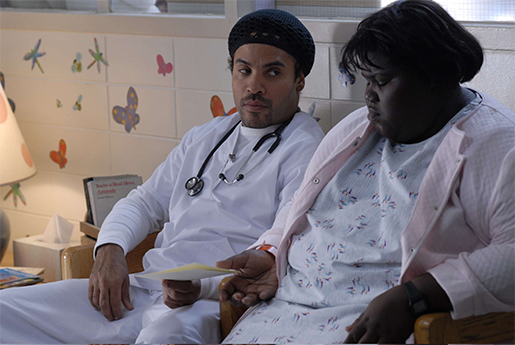
Small details make the period convincing; for instance, watch out for a reference of a certain film about Charles Bukowski. Precious has the feel of a docudrama at times. The camera wavers a little and on rare occasions makes that jittery zoom-in to create a sense of spontaneity. Mostly images are fairly smooth or completely still. Some camera operators feel compelled to shake their camera as violently as though they were shaking the audience’s shoulders while screaming “This is REAL!” The cinematography by Andrew Dunn and Darren Lew avoids this tactic, opting for subtlety on the rough Harlem streets and the bare cubicles of the government agency. Interior spaces are given more theatrically to convey the drama. Inside the dingy apartment with Mary, black shadows scratches up the overly harsh oranges and yellow wallpaper like a tacky hellhole. The classroom where Ms. Rain teaches tends to glow coolly, like a lighthouse beacon.
The film penetrates our defenses and completely absorbs us. Because the circumstances are so dire, it would have been insulting to tone down the viciousness of Mary out of some pious sense of political correctness. I appreciate how fearless Daniels is in portraying Precious as a genuine victim of abuse as horrible and real as it is for the thousands of Preciouses living and suffering now. There are so many revelations among the performers. Newcomer Gabourey Sidibe is all the better for having no method or experience as an actor. Somehow, she accumulates great range with her powerhouse performance as a sad, defiant survivor. This fall, Precious joins Lone Scherfig’s An Education as another excellent film about a specific teenage girl’s coming of age.
Coming from a theatre background, Daniels approached his film from that perspective. To get these performances, instead of rehearsing, Daniels revealed his deepest fears and lusts, which left everyone raw and open. Having established trust, he directed in a fashion he calls “primal”, and he also admitted to speaking in tongues. No egos were allowed on the set. Not even makeup. Pop celebrities like Carey, Patton and Mo’Nique not only look authentic in this environment, but this method set their acting chops on high. As the social worker, Carey is very compelling. Patton too is able to do just as much from a warm place. Also deserving a nod is Lenny Kravitz as a very kind nurse. This reminds me of the casting for Tim Blake Nelson’s merciless masterpiece The Grey Zone (2002). What are David Arquette and Natasha Lyonne doing in a brutal Holocaust film? Oh right! They’re talented actors making good on roles that their mainstream celebrity sabotages their chances of actually getting in the first place.
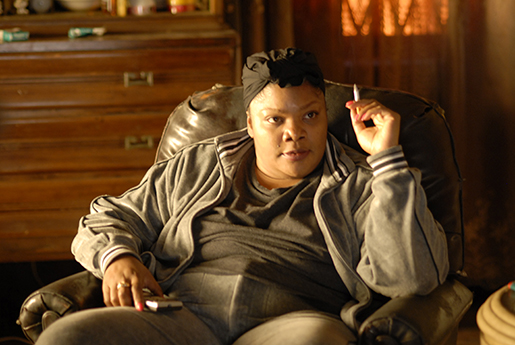
For me, the standout is Mo’Nique because she goes down into the most bleak place as Mary Jones. Mary is one of the best contemporary villains because she is such a very credible monster. What makes Mary all the more despicable is that she plays ‘the good mom’ when her welfare officer visits. She knows how to act lovingly and how to say he right things. Her cruelty is not based on ignorance. She chooses to inflict her family with base and gruesome torture. Precious doesn’t dare spread her wings because her mother has the clippers ready.
It is incredibly unnerving when Mary holds Precious’ newborn baby with one hand and a smoldering cigarette in the other. She makes a chilling observation, “He has your father’s eyes.” The whole time I was thinking about that cigarette. What Mary does next is just as shocking. An encounter near the end of the film has Mary, Mrs. Weiss, and Precious in a verbal standoff that unleashes relentless power. Mary is pushed to explain the moment where she came to resent her daughter. Where it comes from reveals such utter and astonishing depths of self-loathing. If Precious has chance, then Mary is at once irreparably damaged and unforgivable.
At the 28th Vancouver International Film Festival, Lee Daniels was in attendance for a Q&A. Asked why he made the film, Daniels told us about a shocking sight he saw at twelve years old on a hot Saturday afternoon at 3 pm. Four houses up from where he lived, he and his mother knocked on the door. It opened. A five-year-old girl stood before them. Naked. Bleeding out of her genitals. Crying. “My momma’s gonna kill me!” Daniels had never seen fear in his mother’s eyes until that moment. He felt nausea and anger. Years later he read Push and those feelings and memories came flooding back. By making the film, Daniels wanted to heal himself as well as others.
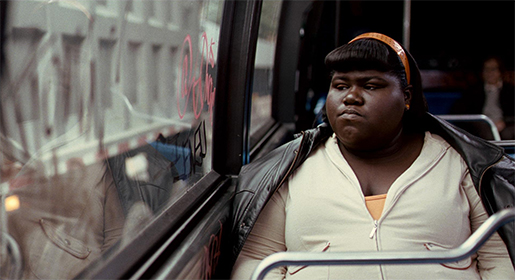
PRECIOUS: Based on the Novel PUSH by Sapphire Trailer
BLACK PEARL (1969) by The Checkmates
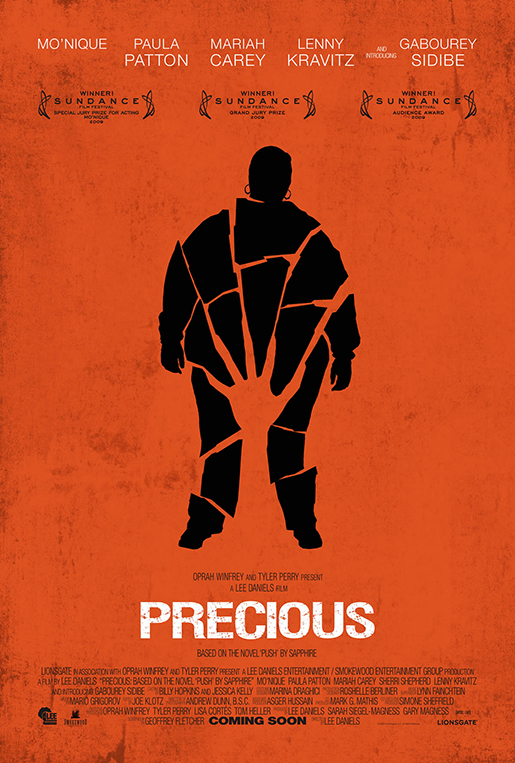
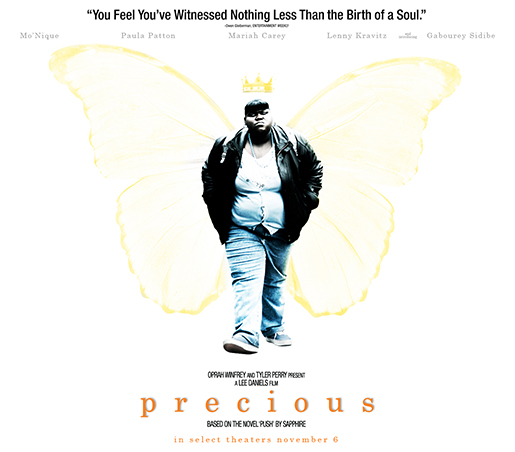
© 2008 – 2026, CINELATION | Movie Reviews by Chris Beaubien. All rights reserved.














